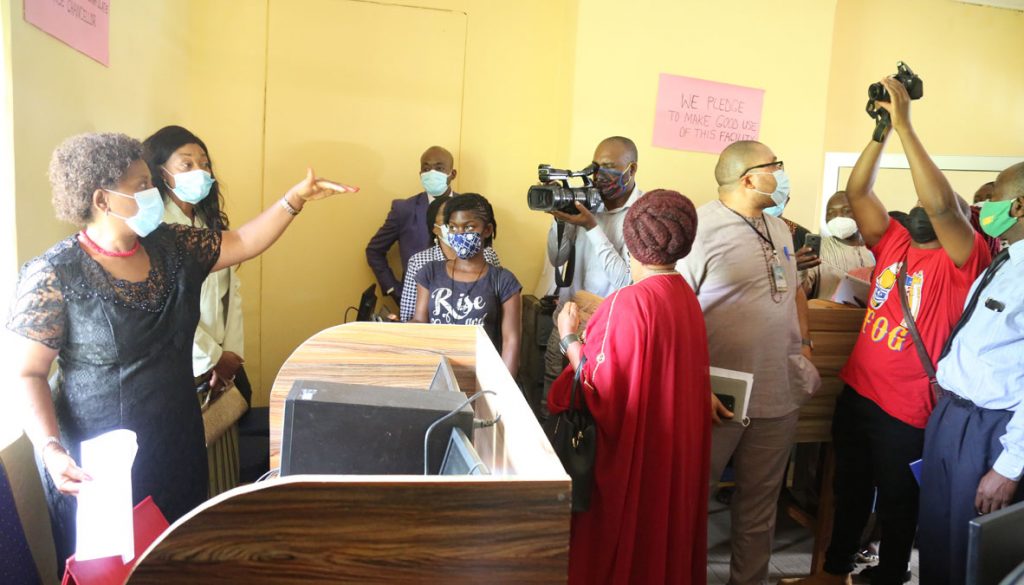UBa Pledges Renewed Commitment with the CBCHS to Ensure Inclusive Education
The CBC Health Services under its Socio-Economic Empowerment of Persons with Disabilities (SEEPD) program has officially donated infrastructural and material equipment to the University of Bamenda (UBa), aimed at facilitating the teaching and learning environment for lecturers and students with disabilities in this institution. The ceremony took place at the University premises on April 28, 2021, and officiated by the Director of the CBC Health Services, Prof. Tih Pius Muffih and the Deputy Vice-Chancellor in charge of Teaching, Professionalization, and Development of Information and Communication Technology, Prof. Suh Cheo Emmanuel who represented the Vice-Chancellor of UBa.
The donated infrastructure consisted of three access ramps measuring 57 meters, one to a refurbished Resource Center at the University, another to the faculty of Health Sciences, and a third to the Infirmary. The University also received accessible toilets for learners with disabilities
Material equipment worth about 7.9 million CFAF donated to the University from 2017 up to this moment comprised of 8 computers, a Perkins Braille machine, a projector, Digital Recorders, Talking Calculators, Magnifiers, a 3-in-one Scanner, Photocopier and Printer, 9 Talking Watches, and Footballs with jingles etc.
These donations are part of fulfilling the terms of a Memorandum of Understanding between the CBC Health Services SEEPD program and UBa, and will greatly be of service to the more than 65 students with disabilities who study in this University.
Prof. Suh, on behalf of the entire University body, appreciated the CBC Health Services for ensuring the successful implementation of this MoU signed on May 26, 2020. This MoU is aimed at fostering cooperation and collaboration in the advancement of knowledge and the provision of opportunities to enhance education for all. Through this MoU, staff, and students have been provided with skills to facilitate the teaching and learning of persons with disabilities in the University of Bamenda.
The CBC Health Services has also collaborated with the University in the orientation of freshmen, socio-cultural and sporting activities, pedagogic seminars, and open day, all geared towards promoting the vulgarization of inclusive quality and diversity of challenged children on campus.
Noting that persons with disabilities have equal rights to education, Prof. Suh elaborated other plans by the University Administration to continue to make the teaching-learning environment in this University more inclusive-friendly. These include plans to acquire electronic boards that will carry messages on the importance of inclusion at the University of Bamenda. He implored all.
University Administrators led by Prof. Suh warmly receive the CBC Health Services team led by Prof. Tih
Deans and Directors at the University to carry all messages on inclusive education to their staff for inclusion to be embedded in the various teaching programs in their respective faculties and schools in line with the policy of the University. As immediate beneficiaries, the students were urged to be proper stewards and make good use of the equipment.
The Director of the CBC Health Services, Prof. Tih Pius applauded the University of Bamenda for gradually and systematically cultivating a spirit of inclusion. The University has been praised for recruiting a Braille Expert to provide support to students with profound vision impairments; providing Disability Inclusion signs on campus; creating an Association of Students with Disabilities, and respecting Universal Designs in the provision of Universal Access to all key structures of the institution.
The DHS used the occasion also to recommend the setting up of a Disability Service as an arm of Student’s Affairs, to act as a liaison with the rest of the University in providing vital information that will assist various departments in taking informed actions to include students and staff with disabilities. To achieve this novel concept in the University milieu in Cameroon, Prof. Tih announced that the CBC Health Services is ready to sponsor any staff of UBa with a passion for Disability Inclusive Education in an African University to gain required skills. The staff will learn best practices that can be adapted to the context of Cameroon.
“With these initiatives in place, it builds into the rubrics of the University whose goal is to offer services to all without any deprivation irrespective of gender, cultural affiliation, sexual orientation, historical context, financial capacity, and physical impairment,” Prof Suh remarked.
Ndim Clement Yuh, a visually impaired student says learning has been made-easy
One of the visually impaired students of the Department of History, Ndim Clement Yuh enumerated a plethora of the challenges they faced before the coming of this assistance from the CBC Health Services in partnership with the University. These, he said, included but not limited to transcription difficulties, inaccessible offices, lack of pedagogic material, and equipment, etc. Addressing these challenges to him is rendering great service to them as well as other prospective students. With this win-win partnership, Ndim Clement said UBa is living up to its motto of being the University of the Future.
The work of the SEEPD program in line with education in the Northwest region, according to the Program Manager, Mr. Awa Jacques Chirac, can be traced back to 2009 with the aim of promoting inclusion. This has led to functional partnerships with the Regional Delegations of Secondary and Basic Education. The project, the Program Manager noted, now focuses on System Strengthening to ensure that all learners with impairments are without barriers. Mr. Awa remarked with pride that the Northwest Regional authorities are respecters of the constitution and promoters of the 2010 law that protects the rights of persons with disabilities.
It should be noted that this work has been achieved, thanks to funding from the Australian Government through Australian NGO Cooperation Program (ANCP).
Students with disabilities no longer have to go home to ease themselves
